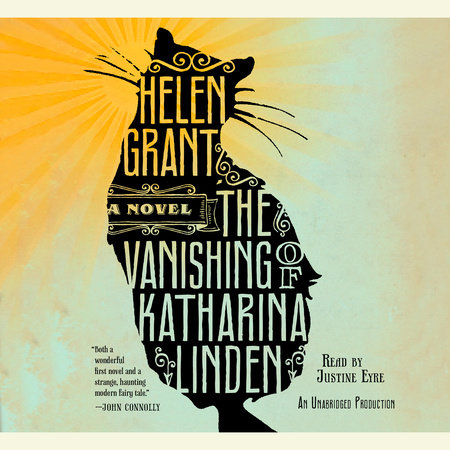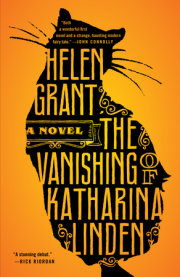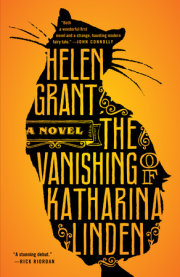Chapter One My life might have been so different, had I not been known as the girl whose grandmother exploded. And had I not been born in Bad Munstereifel. If we had lived in the city--well, I'm not saying the event would have gone unnoticed, but the fuss would probablyonly have lasted a week before public interest moved elsewhere. Besides, in a city you are anonymous; the chances of being picked out as Kristel Kolvenbach's granddaughter would be virtually zero. But in a small town--well, small towns everywhere are rife withgossip, but in Germany they raise it to an art form.
I remember my hometown as a place with a powerful sense of community, which was sometimes comforting and sometimes stifling. The passing of the seasons was marked by festivals that the whole town attended: Kareval in February, the cherry fair in the summer,the St. Martin's Day procession in November. At each one I saw the same faces: our neighbors from the Heisterbacher Strasse, the parents who gathered at the school gate every lunchtime, the ladies who served in the local bakery. If my family went out to dinnerin the evening we were quite likely to be served by the woman my mother had chatted to in the post office that morning, and at the next table would be the family from across the street. It would take real ingenuity to keep anything secret in a place like that--orso everyone thought.
Looking back on that year, those were innocent days; a time when my mother cheerfully allowed me at the tender age of ten to roam the town unsupervised--a time when parents let their children out to play without once entertaining the horrific notion thatthey might not return home again.
That came later, of course. My own problems began with my grandmother's death. A sensation at the time, it should by rights have been forgotten when the true horrors of the following year unfolded. But when it became clear that some malevolent force wasat work in the town, public opinion looked back and marked Oma Kristel's death as the harbinger of doom. A Sign.
What was really unfair about the whole thing was that Oma Kristel hadn't so much exploded as spontaneously combusted. But Gossip is Baron Munchhausen's little sister, and never lets the truth get in the way of a good story. To hear the tale retold on thestreets of Bad Munstereifel, and especially in the playground of the Grundschule, which I was attending at the time, you would have thought my grandmother went off like a blaze in a Chinese fireworks factory, filling the air with cracks and pops and dazzlingflares of colored light. But I was there; I saw it happen with my own eyes.
Chapter Two
It was Sunday, December 20, 1998, a date that will be forever marked in my mental history. The last Sunday before Christmas, the day we were to light the last candle on the Advent crown, the last day of my grandmother's life, and, as it turned out, thelast time the Kolvenbach family would ever celebrate Advent.
My mother, who at that time was one of only three British citizens living in Bad Munstereifel, had never quite come to grips with German Christmas customs. She usually forgot about the Advent crown until the first Sunday was upon us and the only ones leftwere tatty lopsided efforts stacked up outside the supermarket on the edge of town. This year's crown was a sad-looking affair with four improbable blue candles squatting uncomfortably on a ring of artificial greenery. Oma Kristel took one look and marchedoff to get a proper one.
The one she bought was a beauty: a big coronet of dark green foliage interwoven with crimson and gold ribbons and decorated with tiny Christmas baubles. Oma Kristel carried it into our dining room as ceremoniously as though it had been a jar of frankincensefor the infant Jesus Himself, and set it down in the middle of the table. My mother's crown, with the unseasonal blue candles, was relegated to the sideboard and eventually, still unlit, to the trash. If my mother had any opinion about this, she did not expressit other than by a slight tightening of the upper lip.
That Sunday a special dinner was being planned. As well as Oma Kristel, we were also expecting my father's brother Onkel Thomas, Tante Britta, and my cousins Michel and Simon, who had all traveled down from Hannover. My mother, who normally had a robustattitude toward German housekeeping, had worked herself up into a state of frenzy over the cooking and cleaning. Our house was one of those old traditional Eifel houses, constructed of a kind of half-timbering called fachwerk; wildly picturesque to look at,such buildings are low and dark inside, with tiny windows that admit only the stingiest amount of daylight and make the cleanest rooms look dingy.
The menu proved to be an equal source of stress; Onkel Thomas was a man of very plain tastes and would as soon have thought of eating witchetty grubs as something non-German. My mother tormented my father a little beforehand with threats to serve up curryand chips, but in the end the prospect of Onkel Thomas pushing the dinner around the plate with a fork like a pathologist investigating a stool sample was simply too much. She determined to make Gansebraten, roast goose with a stuffing of Leberwurst, muttering,"Anything with Leberwurst in it is sure to be a hit with Thomas and Britta."
While my mother was putting the finishing touches to the goose, and my father was uncorking the wine, Onkel Thomas and his family arrived. Onkel Thomas almost blotted out the light as he came through the front door, his shoulders filling the frame. TanteBritta, a tiny woman with sticklike limbs and a birdlike swiftness in her manner, followed him, and behind her came Michel and Simon.
In Germany, it is considered proper that a child should go and shake hands when meeting someone; I hated doing this, and hung back, but Oma Kristel pushed me forward with a well-timed poke in the back. Reluctantly, I held out my hand to Onkel Thomas, whoenfolded it in his enormous fleshy paw.
"Hallo, Pia."
"Hallo, Onkel Thomas," I replied dutifully, willing him to let go of my hand so I could wipe my fingers surreptitiously on the leg of my trousers; Onkel Thomas always had clammy hands.
"You've got bigger," he commented in his hearty way.
"Um-hmm," I murmured, then with sudden inspiration, "I must go and help Mama in the kitchen."
With some relief I escaped into the kitchen, where condensation was running down the tiny windowpanes and my mother was moving about frantically through the steam with rather the effect of someone stoking the boiler in the engine room of a steamship. Shefixed me with a steely gaze.
"Out," was all she said.
"Mama, Onkel Thomas and Tante Britta are here."
"Oh, God," was my mother's encouraging remark. She shooed me out of the kitchen and back into the living room, where I discovered Michel eating the last of the chocolates that St. Nicholas had brought me on December 6. The ensuing rumpus lasted until dinnerwas ready, and my mother emerged from the kitchen with a harried expression to tell us that we could take our places at the table. She regarded Michel's red face, blotchy with crying, and her upper lip tightened again, but she said nothing. Discretion is thebetter part of valor; she went back into the kitchen and finished carving the goose.
The moment my mother announced that dinner would be imminently on the table, everyone rushed to the bathroom, Oma Kristel included. Managing without a last-minute cosmetic repair job was simply not an option with Oma Kristel, whose one overriding vicewas vanity. None of us had ever seen Oma Kristel without makeup, or with her hair au naturel; the latter was always set and sprayed into a sort of glistening silver helmet.
Today the hairdo had wilted slightly because Oma Kristel had been into the kitchen several times to dispense advice about the making of glazed peaches to go with the roast. She therefore took an enormous can of hairspray like some sort of torpedo intothe bathroom with her, as well as her bulging bag filled with expensive lipsticks and industrial-strength wrinkle removers.
Oma Kristel looked good that day, as my father, Wolfgang, and his brother Thomas lugubriously agreed at the funeral. Always careful with her diet, she had retained an elegant figure right into her old age, with slim legs encased in sheer stockings andfashionable little black leather shoes with high insteps and pointy toes. She wore a skirt of some velvety black material, unsuitably tight and undeniably chic, and a shocking pink mohair sweater cinched at the waist with a thin black belt. To her bosom, whichstill had a jutting appearance reminiscent of a wartime pinup, she had attached a large diamante brooch like a medal pinned to a uniform. I like to think that, as she took her final look at herself in the big bathroom mirror, she was satisfied with what shesaw.
At any rate, she spent some time touching up her makeup, so that my mother was actually putting the plates on the table before Oma Kristel got to the hairspraying bit.
"Oma Kristel!" my mother called in a tentative voice, not liking to adopt too strident a tone toward her strong-minded mother-in-law.
"Mama!" bellowed Onkel Thomas, who was less sensitive on such topics, and who was no doubt looking forward to gorging himself on the goose and Leberwurst.
Oma Kristel patted her hair into place, and then sprayed it with the dedication of a car mechanic giving a BMW a paint job. She managed to frost her bosom and shoulders with the stuff too, until the pink mohair was glistening with tiny droplets and therewas a fog of hairspray hanging over her. Then she put the can back into her bag and marched straight to the table.
The main lights were out and my father was standing ready with the box of matches poised to light the Advent crown. Oma Kristel just shot him a look that said "Who's in charge here?" and stretched out her hand for the matches. She slid open the box, extracteda match, and struck it with a flourish.
The flame flared up in the gloom of the unlit room, a tiny golden beacon. For a moment Oma Kristel held it aloft, then the unthinkable happened. The match slipped out of her fingers and fell straight onto her pink mohair bosom. With a whooomph! like thesound of a gas furnace firing up, the hairspray with which Oma Kristel had doused herself ignited, obliterating her in a column of flames.
For one ghastly and endless second there was silence, and then all hell broke loose. Tante Britta let out a full-blooded horror-film scream, pressing her hands to her face. There was a crash as my father floundered around in a tangle of chairs, tryingto lay hands on something that would douse the flames. Onkel Thomas, struggling to take off his jacket to wrap around the blazing figure, was swearing mindlessly, his eyes round with horror. Both Michel and Simon were howling with terror. I think I was in thesame state myself; for days afterward my throat was hoarse with screeching. My mother, who had just come through from the kitchen with the roast goose in her oven-gloved hands, dropped the whole thing on the quarry-tiled floor, where it exploded on impact.
Only Sebastian in his high chair remained unmoved by the whole thing, apparently under the impression that this was part of the normal Advent entertainment. The rest of us panicked. And then at last with a horrid finality Oma Kristel pitched forward ontothe dinner table in a explosion of shattered wineglasses and broken crockery.
My father and Onkel Thomas finally sprang into action; my father upended a jug of mineral water over Oma Kristel's smoking remains, and Onkel Thomas spread over the whole mess the jacket he had finally managed to remove. It was too late for Oma Kristel,however; she was mouse-dead, as the Germans say. The shock had stopped her heart with the finesse of a sledgehammer smashing a carriage clock. Her still elegantly shod legs akimbo, she looked like a shopwindow mannequin, and not like Oma Kristel at all. Inthe silence that followed, Sebastian at last began to cry.
Copyright © 2010 by Helen Grant. All rights reserved. No part of this excerpt may be reproduced or reprinted without permission in writing from the publisher.










